A photo chronicle of the past few years of protest against the Israeli government’s handling of newly discovered offshore natural gas reserves. Social activists, and economists, believe that Israeli citizens — and the state — are getting an unfair deal from the private companies who own the drilling rights.
Photos by Activestills.org
Text by Michael Schaeffer Omer-Man
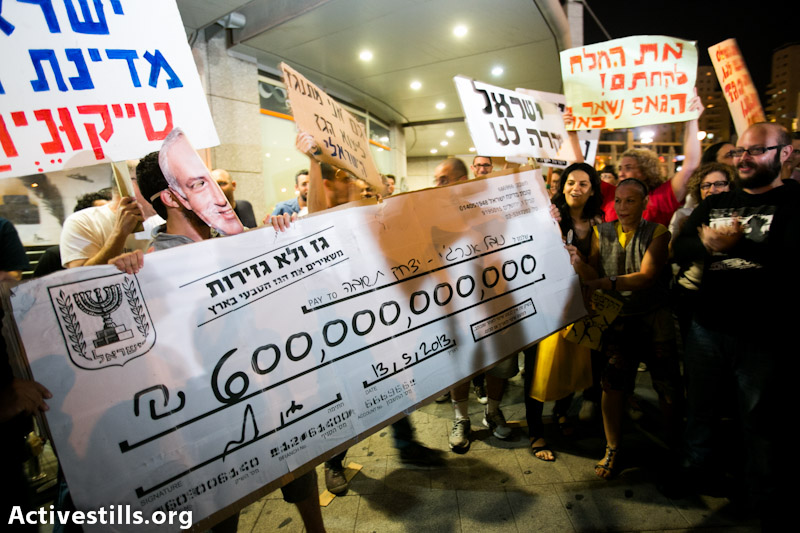
Protesters hold an oversized check from the State of Israel to Yitzhak Tshuva with the estimated value of natural gas during a demonstration against the privatization of natural gas found in the Mediterranean Sea. Protesters marched to the house of then Energy Minster Silvan Shalom, May 11, 2013. (Yotam Ronen/Activestills.org)
For the past few years a dedicated group of Israeli social activists have been protesting what they, some economists and even a number of members of Knesset have termed “the great gas robbery.”
The protests came on the tail end of a wider social protest movement, the lasting and central message of which focused on anger toward the concentration of wealth among a small number of tycoons with close ties to the government and politicians.
Read also: Gas exports: Is the government with us, or against us?
Nobody ever really thought that one of the largest gas discoveries in recent history would benefit Israel. Since the country’s inception, Israelis have been mocking themselves for establishing a Jewish state on the one piece of the Middle East with no oil.
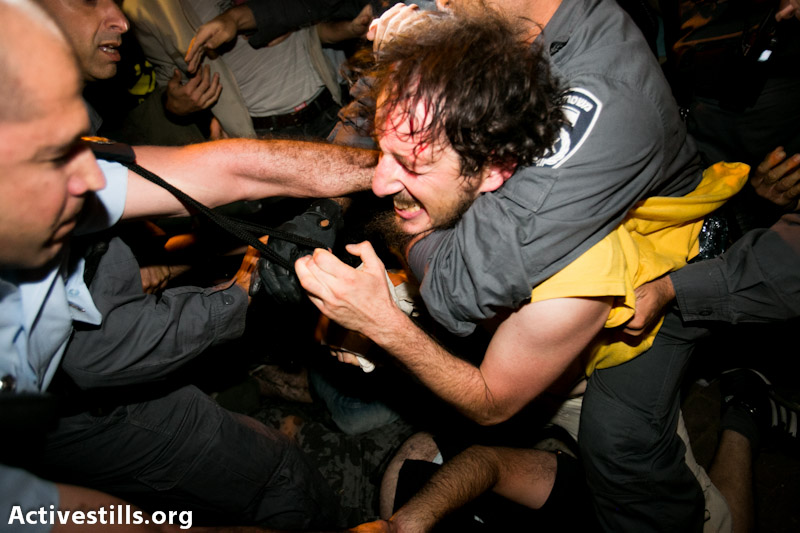
Police arrest a protester participating in a demonstration against the privatization of natural gas found in the Mediterranean. Protesters marched to the home of then Energy Minster Silvan Shalom on May 11, 2013. (Yotam Ronen/Activestills.org)
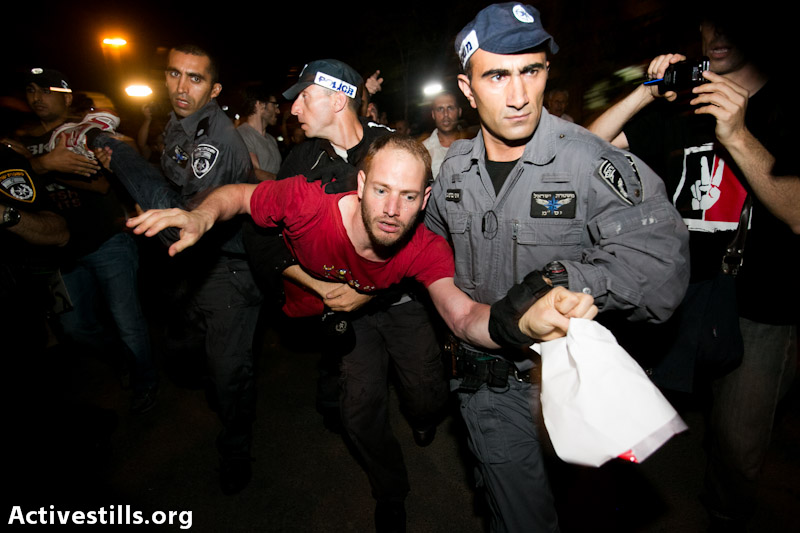
Police arrest protesters during a demonstration against the the privatization of natural gas discovered in the Mediterranean. Protesters marched to the home of Delek Energy owner Yitzhak Tshuva, Netanya, May 18, 2013. (Yotam Ronen/Activestills.org)
Then Leviathan happened. When the discovery of the Tamar and Leviathan offshore natural gas fields was made, countries throughout the neighborhood — Turkey, Greece, Cyprus, Lebanon, Egypt, Jordan and Palestine — all started jockeying for a piece of the pie. Israelis did to.
When Israel granted the licenses to drill for gas, because nobody believed that there was any gas, the contracts were very favorable for the drilling companies — less so for the country. Ever since the discoveries were made, Israelis have been demanding that the flow of gas benefit, first and foremost, Israelis.
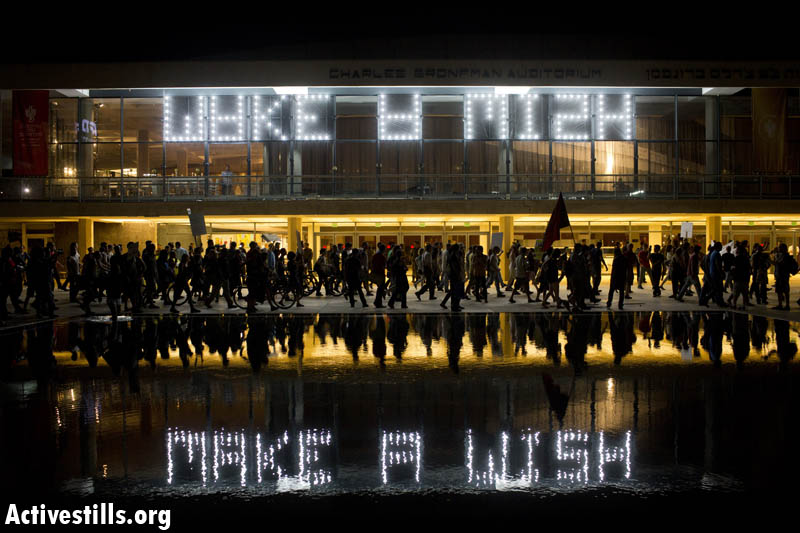
Demonstrators march in Habima Square in Tel Aviv during a protest against the privatization of natural gas found in the Mediterranean sea, May 25, 2013. (Oren Ziv/ Activestills.org)
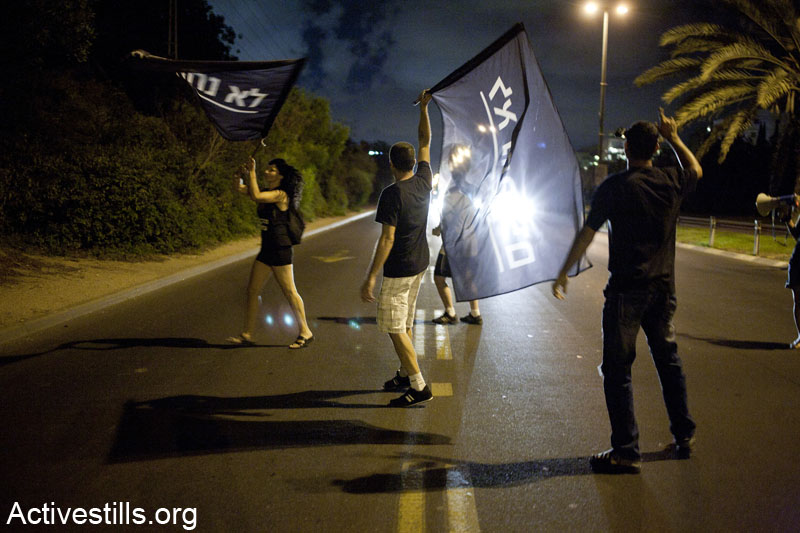
Activists block Ayalon highway in Tel Aviv during a demonstration against the privatization of natural gas found in the Mediterranean, June 15, 2013. The protesters demonstrated in front of the home of then Finance Minster Yair Lapid and marched through his neighborhood, blocking several main roads. (Keren Manor/Activestills.org)
Prime Minister Benjamin Netanyahu, however, wanted to overrule the anti-trust commission. The only problem? He doesn’t have the authority to do so. The only government official endowed with the authority to over-ruled the anti-trust commissioner is Economy Minister Moshe Kahlon, who along with two other ministers, has recused himself from the entire affair due to personal ties with one of the small group of tycoons who control the Israeli side of the gas resources.
Netanyahu is being blackmailed by the energy companies who are threatening to indefinitely delay the flow of gas with litigation if the current arrangement is changed in a way that harms their interests. So the prime minister did what any good contemporary politician would — he declared natural gas to be a matter of national security.
The only problem? He has a razor-thin majority coalition and with the absence of the three ministers who recused themselves, he doesn’t have a majority in the Knesset to make the changes to the deal. Facing a certain loss, Netanyahu indefinitely delayed the vote Monday night.

Shadows of protesters and border policemen in front of the house of then Finance Minster Yair Lapid during a demonstration against the privatization of natural gas discovered in the Mediterranean sea, Tel Aviv, June 15, 2013. The protesters demonstrated in front of the minister’s home and marched through his neighborhood, blocking several main roads. (Keren Manor/Activestills.org)

Protestors block a road in Tel Aviv during a demonstration against the privatization and exportation of natural gas. June 19,2013. The banner refers to the protests in Turkey that were happening at that time. (Keren Manor/ Activestills.org)
In recent days the deal has become an international affair, with the American government reportedly putting pressure not only on the Israeli government, but also on opposition MKs, to advance the deal. In addition to the fact that the largest stakeholder in the deal is an American company, Washington reportedly views the deal going through as advancing American geopolitical interests.
There has been debate over how much of the gas should be exported and how much should serve the domestic market, what the ownership stake division between the companies and the state should be, how and if the state should regulate the cost of the gas once it flows ashore, and whether or not to break up what is now described as a cartel controlling the vast majority of the gas.
All of that is coming to a head this week in Israel. A number of months ago Israel’s anti-trust commissioner declared that the two companies who own most of the gas, U.S.-based Nobel Energy and Israeli consortium Delek, comprise an effective monopoly and demanded that the sale of gas in Israel be divided among a handful of companies in order to create competition.
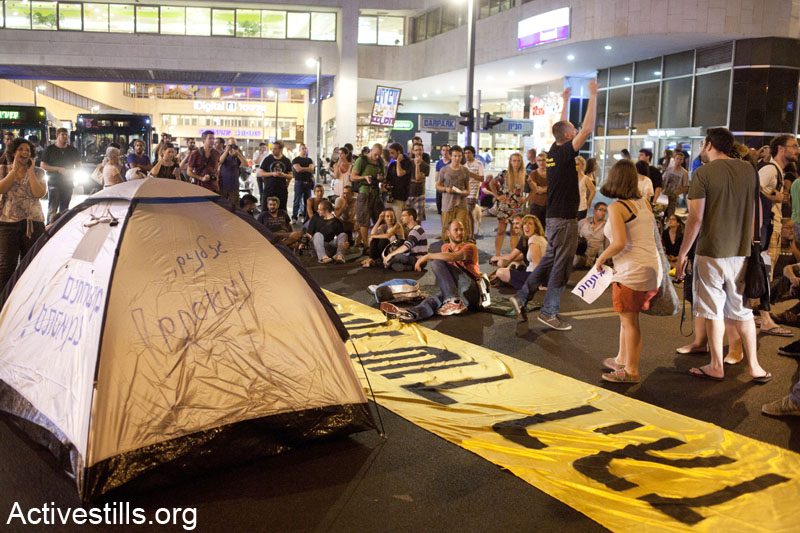
Protestors block Dizengoff Center junction in Tel Aviv during a demonstration against the privatization and exportation of natural gas. June 19,2013. (Keren Manor/ Activestills.org)
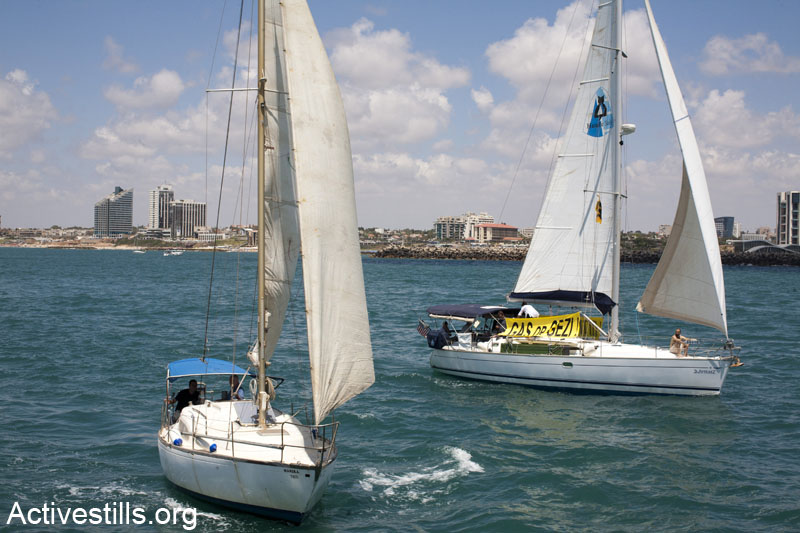
A flotilla protesting against the privatization of natural gas found in the Mediterranean sea. The flotilla left Herzliya and sailed a few kilometers out to sea, June 15, 2013. (Keren Manor/Activestills.org)
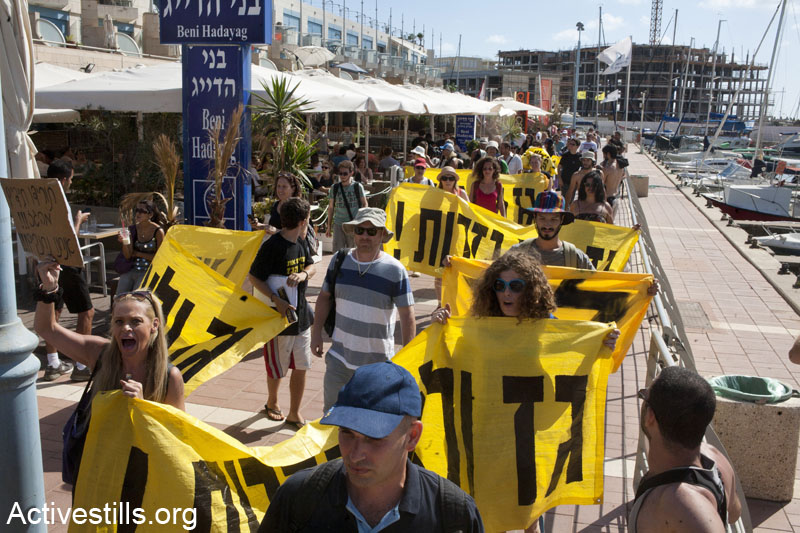
Activists march in Herzliya marina, calling on passersby to not support the Israeli government in its bid to privatize the natural gas found in the Mediterranean sea. The march took place after a protest flotilla left Herzliya and sailed a few kilometers out to sea, escorted by other supporters on boats, June 15, 2013. (Keren Manor/Activestills.org)
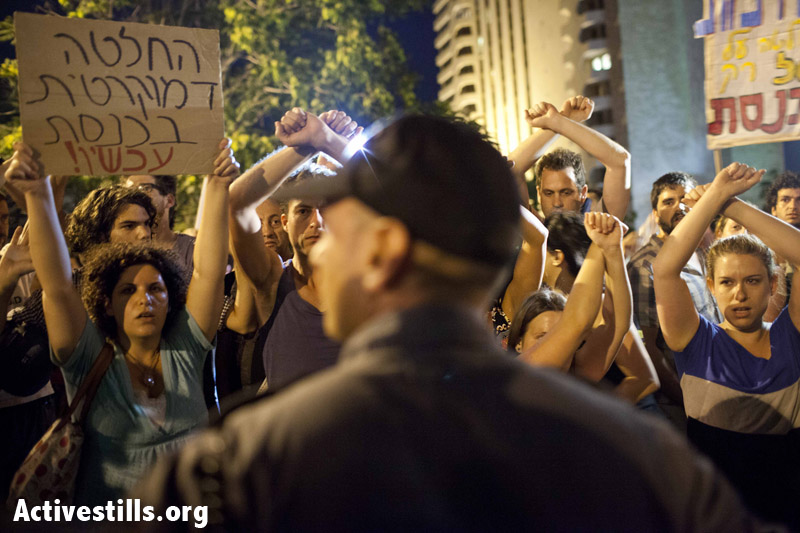
Activists block roads in the center of West Jerusalem, protesting against the Israeli government’s decision to privatize and export natural gas found in the Mediterranean sea, on June 22, 2013. Nine activists were arrested during the demonstration. (Tali Mayer/Activestills.org)

An activist arrested by an Israeli policeman, at an impromptu road block setup in the center of West Jerusalem as part of a protest against the Israeli government’s decision to privatize and export natural gas found in the Mediterranean, June 22, 2013. Nine activists were arrested during the demonstration. (Tali Mayer/Activestills.org)
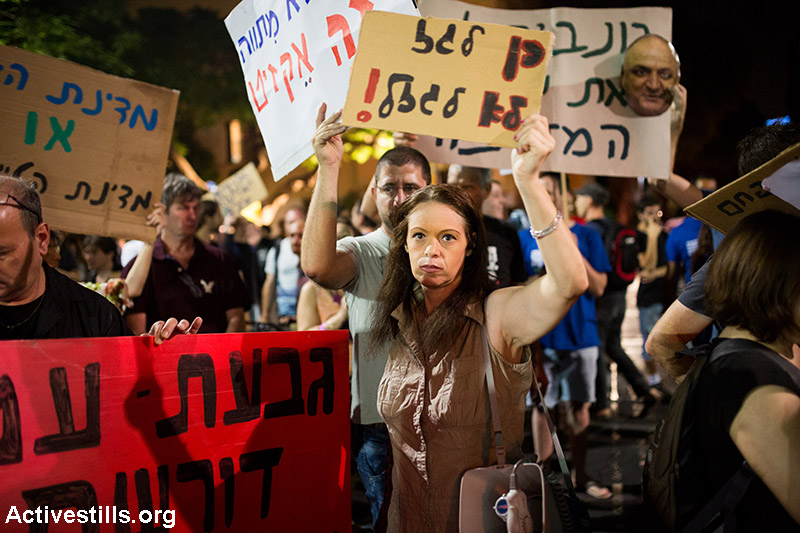
Protesters shout slogans against natural gas privatization in Tel Aviv, May 30, 2015. Around 200 people marched in protest of the government’s policies regarding the privatisation of natural gas found in the Mediterranean sea. (Yotam Ronen/Activestills.org)
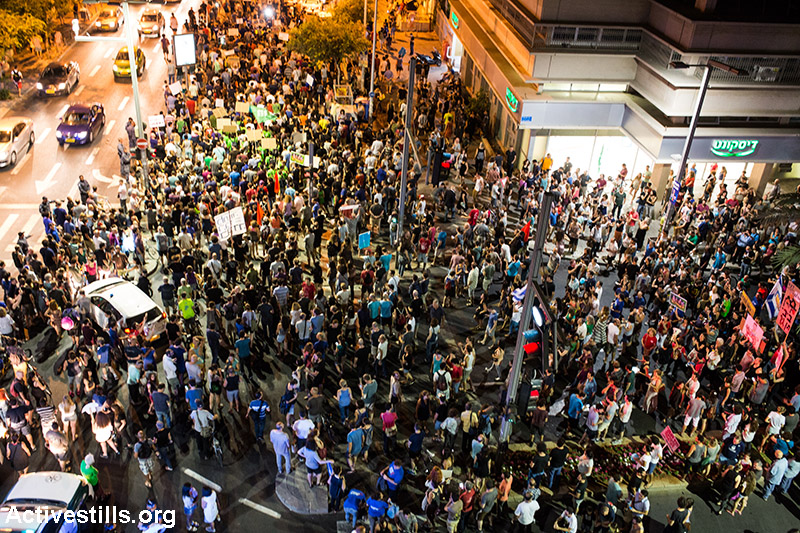
Protesters shout slogans during a protest against natural gas privatisation in Tel Aviv, June 27, 2015. Around 4,000 people took part in the demonstration. (Oren Ziv/ Activestills.org)

Police arrest a protester during a protest against natural gas privatization in Tel Aviv, June 27, 2015. Four protestors were arrested during the demonstration. (Yotam Ronen/Activestills.org)
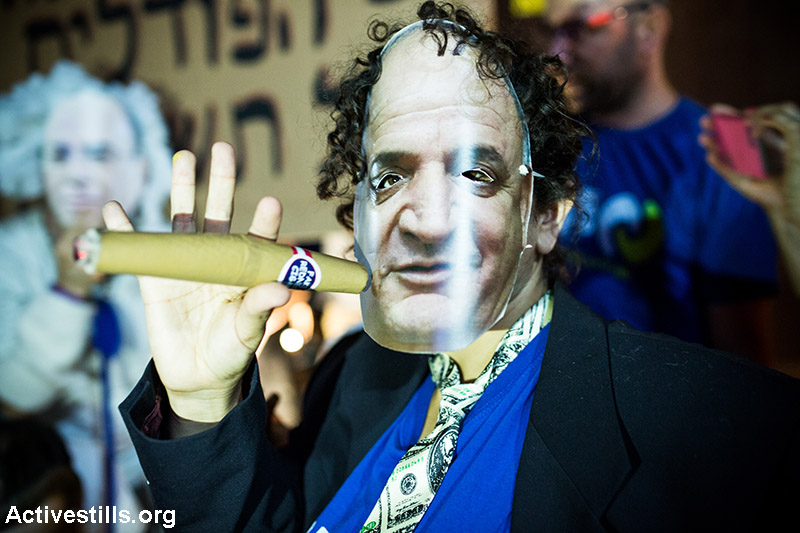
Protester wearing a mask of business man Yitzhak Tshuva, owner of an energy company during a protest against natural gas privatization in Tel Aviv, June 27, 2015. Around 4,000 people marched in the demonstration. (Yotam Ronen/Activestills.org)
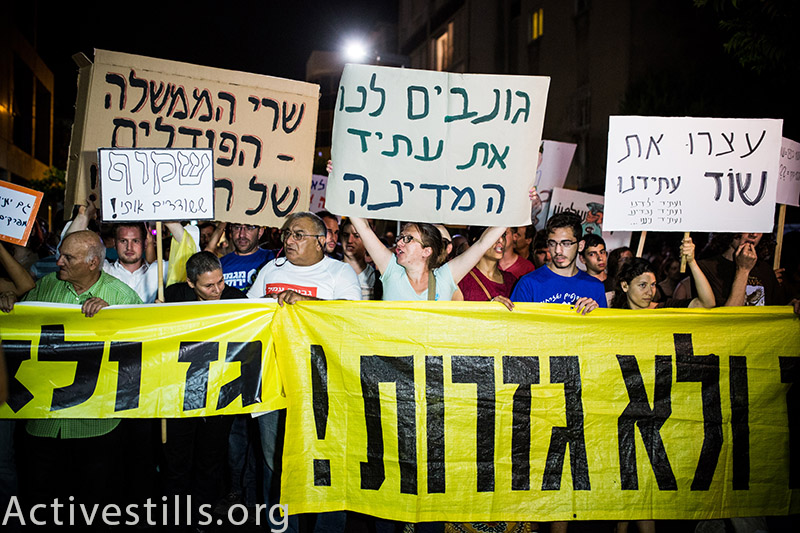
Protesters shout slogans during a protest against natural gas privatisation in Tel Aviv, June 27, 2015. Around 4000 took part. Some of the signs read, “They’re stealing the future of the country,” and “Stop the robbery of our future.” Yotam Ronen / Activestills.org
![Protesters illustrating what they perceive to be the government’s weakness in negotiations with energy companies during a protest against natural gas privatization in Tel Aviv, June 27, 2015. Sign reads: “Government ministers – [Yitzhak] Tshuva’s poodles?” (Yotam Ronen/Activestills.org) Protester illustrating government weakens regarding energy companies during a protest against natural gas privatisation in Tel Aviv, June 27, 2015. Sign reads: "The government ministers - the poodle of Tshuva?" (Yotam Ronen/Activestills.org)](https://static.972mag.com/dev/uploads/2015/06/gas017.jpg)
Protesters illustrating what they perceive to be the government’s weakness in negotiations with energy companies during a protest against natural gas privatization in Tel Aviv, June 27, 2015. Sign reads: “Government ministers – [Yitzhak] Tshuva’s poodles?” (Yotam Ronen/Activestills.org)
Subscribe to The Landline
+972's weekly newsletter



















![Protesters illustrating what they perceive to be the government’s weakness in negotiations with energy companies during a protest against natural gas privatization in Tel Aviv, June 27, 2015. Sign reads: “Government ministers – [Yitzhak] Tshuva’s poodles?” (Yotam Ronen/Activestills.org) Protester illustrating government weakens regarding energy companies during a protest against natural gas privatisation in Tel Aviv, June 27, 2015. Sign reads: "The government ministers - the poodle of Tshuva?" (Yotam Ronen/Activestills.org)](https://static.972mag.com/dev/uploads/2015/06/gas017.jpg)